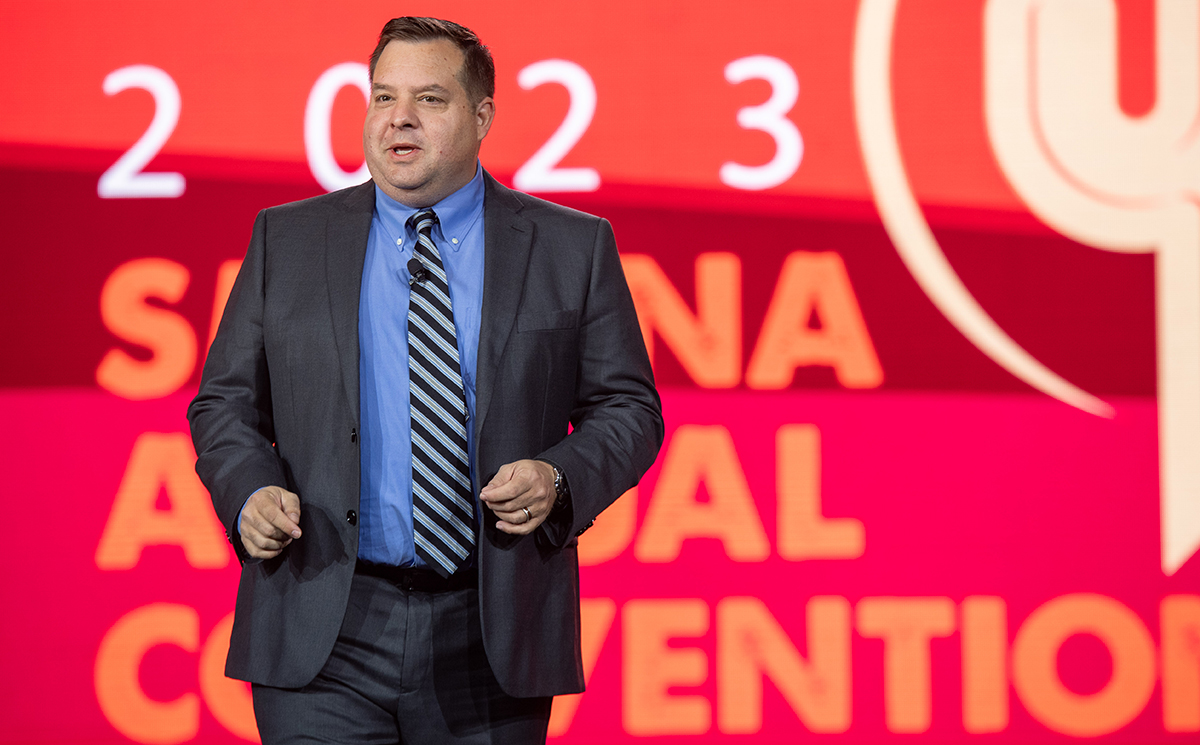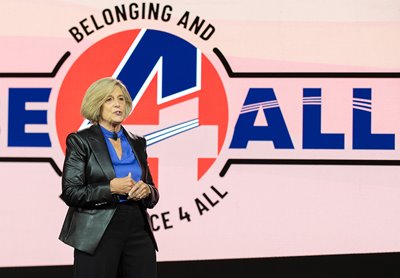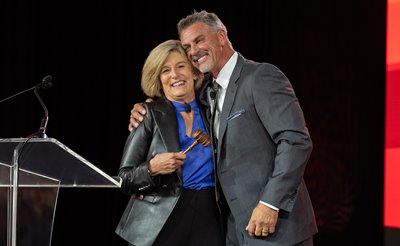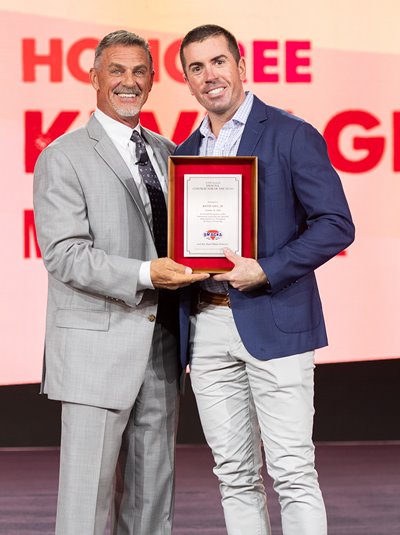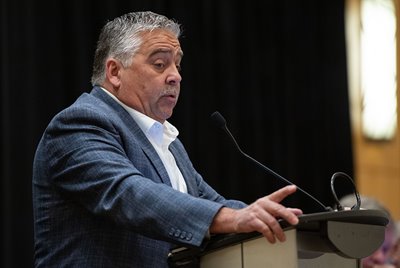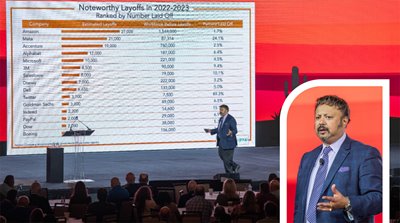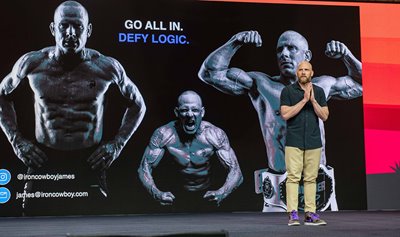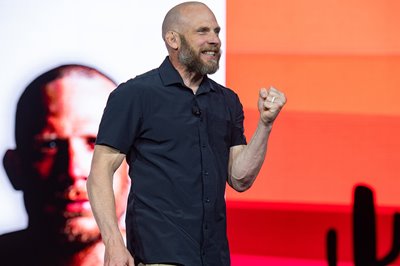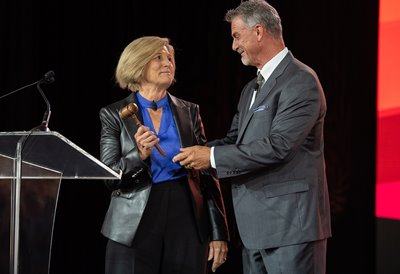 In the 35 years that he has been actively engaged in the union construction industry, SMACNA CEO Aaron Hilger says, “we’ve never had the opportunity to grow like we have today.”
In the 35 years that he has been actively engaged in the union construction industry, SMACNA CEO Aaron Hilger says, “we’ve never had the opportunity to grow like we have today.”
From megaprojects to projects driven by indoor air quality concerns or those created by historic manufacturing tax credits, Hilger says the industry has been given a tremendous future.
SMACNA Past President Tony Kocurek agrees. “It’s time to embrace the future, learn new ways of doing things and identify new opportunities we can use to grow our businesses,” he says. Today, “we face arguably the most significant — maybe even historic — time in our industry.”
Speaking to a crowd of more than 1,000 attendees Oct. 14 – Oct. 18 in Phoenix, Arizona, SMACNA leaders highlighted some key updates and opportunities for contractors as they wrap up the year and move into 2024.
Wanted: Labor
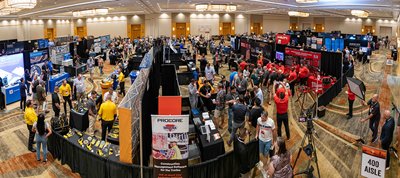 As the industry embraces more historic growth opportunities, “it is exciting and somewhat daunting,” Hilger says. “We need to capture this work and not lose the markets we already have — something that SMACNA and SMART are deeply committed to maintaining.
As the industry embraces more historic growth opportunities, “it is exciting and somewhat daunting,” Hilger says. “We need to capture this work and not lose the markets we already have — something that SMACNA and SMART are deeply committed to maintaining.
“We need to recruit more people who want to learn our trade, become estimators, project managers, and fill every other open role,” he continues. “Recruiting this workforce means that we are casting a wide net, perhaps in communities that we have not looked in as hard as we should have in the past.”
As a result, SMACNA members should alert chapter executives or SMACNA’s labor relations team of their workforce needs immediately so they can make sure SMART is prepared to assist with project success.
“The union cannot pull a rabbit out of the hat and find you 100 workers in a week, but they can if given time,” Hilger says. “I know it is hard to forecast and there are a lot of variables. We understand the issues and are committed to taking advantage of these historic work opportunities.”
And after finding new people, “we also need them to stay with the companies that hire them.” Hilger says. “Improving retention means being flexible and creating work environments that are inclusive and free from harassment.”
SMACNA President Carol Duncan concurs. “The business case for our SMACNA and SMART BE4ALL work is that we need to be an inclusive workplace to attract the best people for our positions,” she says. “That starts with understanding how our people perceive their workplaces. Unless all our people feel they are included and seen, they will not stay. BE4ALL is a long journey, and we will see steady improvements, but we must continue down the path.”
SMACNA’s Strategic Plan Update
During an update to the SMACNA Annual Convention attendees, Hilger also reviewed the association’s progress on its strategic plan.
The first part of SMACNA’s strategic plan is determining the next labor paradigm, which members have been able to witness in action through its collective work on megaprojects and its strong relationship with SMART at the national level. “We share many of the same goals and choose to focus on the 95% of things that we agree on, rather than the 5% of things that labor and management may never approach the same way. We also know that one of our challenges is to bring this type of relationship to local areas that may not be in the same place.”
The second part of SMACNA’s strategic plan involves expanding educational programming. The association continues its current programs, while adding new programming that focuses on both business operations and technological innovations.
Increasing member engagement and interaction is the third part of the strategic plan. “Contractors who come to convention are among our most active members and know how to maximize the benefits that SMACNA provides,” Hilger says, adding that convention attendees only represent about one quarter of total membership. “We would love to see more participation.”
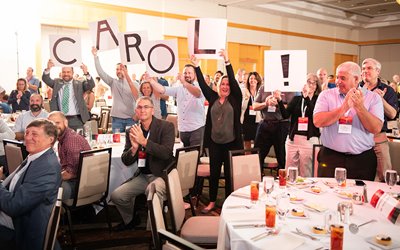 Since SMACNA gets 99% of its members through chapters, they are the conduit for many national programs. “The membership experience varies widely among chapters, and national can better support chapters with programming and resources to deal with time-consuming and less value-added tasks,” Hilger says, adding that to do this the association developed a strong chapter executive education program, expanded its chapter executive orientation and added a mentoring program for new chapter executives.
Since SMACNA gets 99% of its members through chapters, they are the conduit for many national programs. “The membership experience varies widely among chapters, and national can better support chapters with programming and resources to deal with time-consuming and less value-added tasks,” Hilger says, adding that to do this the association developed a strong chapter executive education program, expanded its chapter executive orientation and added a mentoring program for new chapter executives.
“With challenges like manpower, quality of manpower and — for some of us — more work available than ever at one time, we have a lot on our plate,” Kocurek adds. “We must learn to grow and develop to meet these challenges, take advantage of new opportunities to use technology and establish new ways of training the most diverse workforce we have ever seen.
“We can take control and either learn to survive in this new market and forever change the way we do business in this industry or let it pass us by,” he continues. “As my dad used to say, ‘You can drive and take control of your destination or ride and accept wherever it takes you.’ Because you are all here today, I believe I know what you are choosing, and SMACNA is here to help us identify change, prepare ourselves for it and take advantage of it — all to enable ourselves to survive and ultimately be as competitive as possible.”
Meet SMACNA’s New President: Carol Duncan
SMACNA introduces its new board of directors; new president shares her
plans for 2024.
At the SMACNA Annual Convention, Tony Kocurek, owner of Energy Balance & Integration in Albuquerque, New Mexico, passed the association president gavel to Carol Duncan, CEO and owner, General Sheet Metal, Clackamas, Oregon.
As she accepted her new role as SMACNA president — the second women in the association’s history — she shared some career lessons with SMACNA members that she still follows today.
Lesson #1: There Are No Problems, Only Opportunities
Duncan began a real estate career in the 1970s when interest rates were 11%. By 1981, the 30-year mortgage rates reached an all-time high of almost 19%, and the market dried up overnight.
In March of 1982, her dad offered her a controller position at General Sheet Metal after the previous controller walked out, and she accepted.
“I had no idea what I was walking into, but I knew it had to be better,” Duncan says. She saw the challenges of the job as opportunities to work through and grow from.
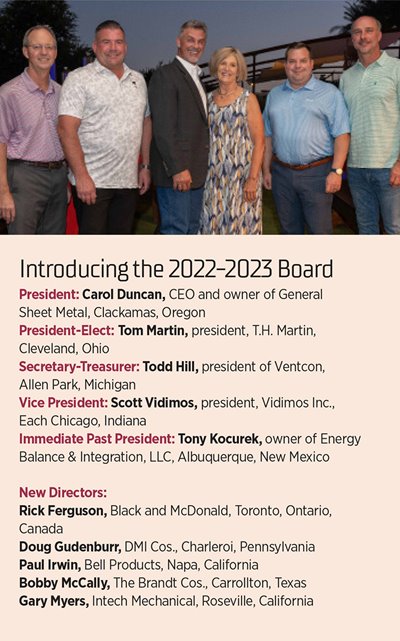 Then, in 1986, her father was ready to close the business doors after he bought out one partner and another left, and Duncan saw an opportunity to buy out his stock and take over the business. “‘No one will ever work for a woman,’ he told me,” Duncan says. “But he must have had some faith because he kept the doors open.”
Then, in 1986, her father was ready to close the business doors after he bought out one partner and another left, and Duncan saw an opportunity to buy out his stock and take over the business. “‘No one will ever work for a woman,’ he told me,” Duncan says. “But he must have had some faith because he kept the doors open.”
Both times, the choices were tough, but Duncan saw opportunities over problems, and that helped her focus on tackling challenges and growing.
Lesson #2: We Can Always Find The Time To Do The Things We Really Want To Do
Duncan attended her first SMACNA Annual Convention in 1996, and she was one of maybe three women in attendance. “I didn’t care,” she says. “I was thirsty for industry education and learning how General Sheet Metal could grow. “Our attendance at the convention caught the eye of a local chapter executive and close friend of my dad’s. He asked me to become involved in the local SMACNA board as the first woman. With 4- and 7-year-old daughters at the time, I told him, ‘I just don’t feel I have the time.’ And he said to me, ‘Carol, we can always find the time to do the things we want to do.’ He was right.”
Duncan says she learned that SMACNA was made up of many people willing to help, share advice and assist her with bettering her business. “All because I found the time,” she says.
Lesson #3 If Your Dreams Don’t Scare You, They’re Not Big Enough
In 2000, Duncan started a peer group with five contractors. Those visits brought tremendous value to General Sheet Metal.
After sending shop supervisors to see each other’s businesses, General Sheet Metal made changes to improve shop productivity. “We learned so much from each other,” she says.
Duncan says she regularly embraced new ideas and challenges, implementing changes in the business as necessary. Between 2012 and 2019, General Sheet Metal increased its work volume. “That growth would not have been possible without the amazing people on the General Sheet Metal team. I also would not have the knowledge or courage to let it happen without the support and industry insights from numerous members of the SMACNA family. That support is unmeasurable.”
Even though it may seem impossible due to time constraints, Duncan encouraged attendees to get involved in SMACNA and dream bigger for their businesses. “A small investment of time can create unimaginable returns; just ask anyone involved,” she explains. “As owners and leaders, it’s critical we share these learning opportunities with the next generation.”
According to Duncan, numerous studies show that the next generation wants to be a part of the bigger picture. “They want leadership to invest in their personal development and aspire to make a difference,” she says. “It not only instills confidence in their roles and the future of the organization moving forward, but the lessons and relationships have lasting rewards. What better way than to engage them in the industry they are already a part of?”
2024 Goals
As SMACNA president, Duncan’s focus for the coming year is twofold.
First is continuing to embrace a diverse workforce. “Until we tackle inclusion, it will be difficult to get traction,” Duncan shares. Inclusion is what unlocks potential in a diverse workforce.”
To measure inclusion, General Sheet Metal uses two local surveys: Top Workplaces in the spring and the 100 Best Companies to Work For in the fall. Not only are these great recruiting tools, but the employee feedback is invaluable.
“Both surveys are free to take and only require a small investment to obtain the employee comments; that’s where the meat is,” Duncan says.
In the surveys, employees are asked to rate on a scale of one to five statements like:
- Employees who help the organization achieve its strategic goals are rewarded and recognized fairly.
- People in my organization care about me.
- Managers at my organization are as diverse as the broader workforce.
- Communications we receive from the organization are honest and open.
“Those statements provide awareness around opportunities where employers can make improvements where they might not have seen one before,” Duncan shares. “General Sheet Metal saved more than one employee from departing by acknowledging and acting on concerns, showing that we see them.”
In addition to diversity and inclusion, Duncan’s second area of focus is to continue encourage PAC participation. “I have been a member of the PAC for over 25 years, and as one of the original political pacesetters, I’ve testified in congressional hearings on pension reform,” she says. “I support this legislative work, and I know that we make a difference. Over the last 18 months, we have seen tremendous progress on our issues, some of which we’ve talked about for over 25 years. These successes come after years and years of steady hard work by our Hill staff and contractors who participate in local and national political activities.”
Duncan is excited to embark on her year as SMACNA president. “At my first convention in 1996, I never would have imagined becoming your national president,” she shares. “I am honored and truly appreciate this opportunity.
“It is with the help of this SMACNA group that I learned my three biggest life lessons; I found the opportunities, I made the time and my dreams are still big,” she adds. “I challenge you to do the same.”
SMACNA Names Its 2023 Award Winners
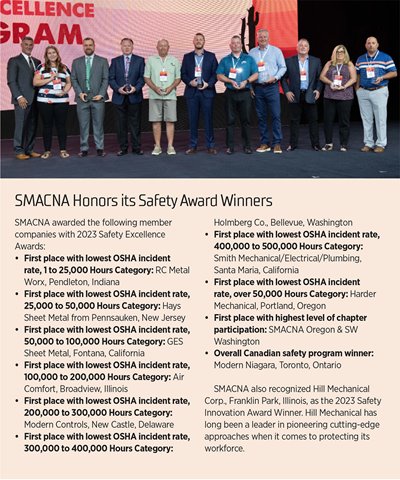 Sheet metal and HVAC industry honors 6 leaders for their hard work.
Sheet metal and HVAC industry honors 6 leaders for their hard work.
Six SMACNA industry leaders were recognized with 2023 awards from the association to honor the best in all facets of the industry from business management to chapter leadership.
Every year at the SMACNA Annual Convention, attendees get a chance to meet the SMACNA Contractor of the Year. The award is given to an individual who exemplifies leadership qualities and dedication to advancing the industry.
This year’s recipient is Kevin Gill Jr., president of Boston-based McCusker-Gill.
Gill has built on a legacy started by his father, Kevin Gill Sr., who was himself a recipient of this award in 2003.
McCusker-Gill is a second-generation HVAC subcontractor that has worked on notable projects, including Brigham & Women’s Building for Transformative Medicine, Boston University’s Center for Integrated Life Sciences and Engineering and Encore Boston Harbor, which had over 1 million pounds of ductwork and was one of the most significant sheet metal projects completed in the Greater Boston area.
“We’ve witnessed you spearheading several changes bringing the company to a whole new level,” Gill’s parents say. “We couldn’t be prouder of how you’ve risen to the occasion.”
“I’m very blessed,” Gill says, accepting his award at the SMACNA Annual Convention. “It’s a family business. My dad did a great job building a great culture at McCusker-Gill, and I feel fortunate to be a great steward of this company.”
Next up was SMACNA’s 2023 Chapter Executive of the Year, which was awarded to James Strother Jr. of SMACNA of Western Pennsylvania. Strother has spent his 22-year career promoting the interests of the skilled trades. This award is given to someone who has been a steadfast advocate for his or her membership.
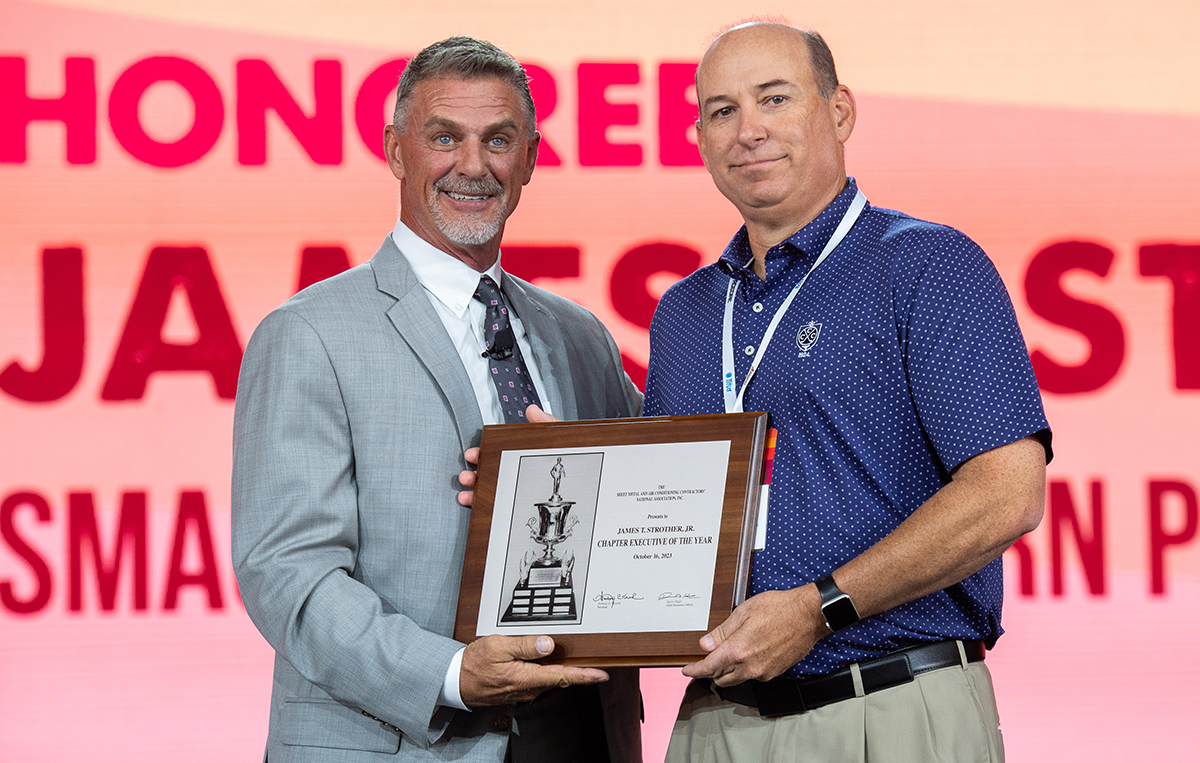
Tony Kocurek presenting James Strother Jr. with the SMACNA 2023 Chapter Executive of the Year award.
“I have a fantastic chapter and a great board of directors,” Strother says. “They allow me to do the things that need to be done.”
Then, SMACNA honored its political advocates for 2023.
SMACNA named Steve Benkovsky, president and owner of Triple S Air Systems in Ronkonkoma, New York, as the Legislative Contractor of the Year for 2023.
Benkovsky has stepped up when called for at high-level and high-pressure political events with government and elected officials. He also became a leading SMACNA ambassador advocating for the industry when seeking reforms to outdated and often misguided regulations and legislation, as well as a critical player in ongoing lobbying efforts to reform Davis-Bacon, contractor procurement rules, registered apprenticeship laws and critical changes to infrastructure policies and prevailing wage enforcement legislation.
Peter Jenkins of the Sheet Metal Contractors Association of Philadelphia & Vicinity took home the honor for SMACNA’s Chapter Executive Legislative Advocate of the Year. He helped build and become a leader in one of SMACNA’s most engaged and SMAC PAC-supportive chapters, and he inspired his members to advocate on reforming industry regulations, prevailing wage laws, pension reforms, energy efficiency tax incentives, and the now expanding commercial, industrial and public markets and infrastructure opportunities.
SMACNA also unveiled a new award at its 2023 Annual Convention: The Charles Corbett Excellence in Labor Relations Award, which recognizes exceptional achievements in furthering the strong relationship that SMACNA contractors have with labor partners. This year SMACNA honored two recipients.
The first recipient is Stephen Doonan, president of DeKalb Mechanical, DeKalb, Illinois. Doonan has always been highly respected by union leaders and contractors alike and has spent a lifetime building strong relationships with labor partners.
The second recipient was awarded posthumously to Thomas Gunning, who served as the chapter executive of the SMACNA Boston Chapter for 30 years. Dedicating this life to the advancement of the construction industry, Gunning was co-chair of multiple building trades’ pension, annuity, health and welfare funds, as well as a long-time member of the SMACNA National Labor Committee and National Joint Adjustment Board.
His son, Tom, says: “He told me, ‘If you be honest, do the right thing and be fair, the middle ground will just come. For 35 years, he lived on those principles and had a successful career.”
Labor Update
SMART General President Mike Coleman shares current labor challenges and offers solutions.
SMART General President Mike Coleman’s career path wasn’t always smooth.
But Coleman insists, “I owe everything to this industry.”
Coleman admits he had a troubled past before being introduced to the sheet metal trade, but once he got into an apprenticeship, his life changed. In fact, industry members became his friends and mentors after his parents passed away.
“I would have nothing if it weren’t for this industry and the people in this industry,” he says.
Coleman shares his background to explain his three core labor philosophies:
- We must communicate with each other.
- We must be able to trust each other.
- We must respect each other.
“If we can control those three things, we’ll have bumps in the road, but we can control anything.”
Coleman outlined SMART’s recent accomplishments and plans for the coming year during his presentation at the SMACNA Convention.
Investing in SMART’s Future
First, Coleman explains, SMART is in its investment stage, “improving the way we do business and how we interact with SMACNA international and chapters.”
To do this, SMART hired an education department head and a full-time instructor to help teach classes for the Locals. It also changed its programming, developing a business managers’ class, revamped its business representatives’ class to be more industry driven and created a production institute.
SMART also created a peer-to-peer group with 57 business managers that are broken down into groups of four or five to get together and share challenges and solutions.
Providing More HELP WITH Megaprojects
Coleman says SMART is doing all it can to address issues surrounding megaprojects.
It starts with redefining the size of megaprojects. Instead of looking at them as total dollar amount, the best path forward is to define these projects as any work the Local cannot provide the workforce for.
“We’re all worried about workforce and our core work, but I want you to know we have invested a lot of resources to answering those questions,” Coleman says.
“We’ve never seen this type of work sitting out there, so we are working hard to address these issues and help with these projects.”
To do this, Coleman is holding monthly regional district council calls, discussing megaproject needs. “We dedicated money to create incentives to get the workforce to the regions where we need them,” Coleman says.
SMART can help service workforce needs the sooner it receives requests. SMACNA members are encouraged to share these needs as soon as possible to improve the response.
Embracing the Pro-Union Presidential Administration
Coleman also shared wins SMART is realizing with the current pro-union presidential administration.
“Given all his faults, President Biden has created opportunities for our industry,” he says. “He made it OK to have project labor agreements on projects, which wasn’t
OK a few years ago. This supports all of us. He has also created opportunities in the industry with over $600 billion in federal funds.”
Diversity and Inclusion is the Path Forward
While expanding the workforce to address growing opportunities and megaprojects, Coleman also encouraged SMACNA contractors to diversify.
“Our locals should look like the communities we all live in,” Coleman shares. “There is nothing wrong with diversity in our unions. I say it because it is the right thing to do and also a necessity.”
Part of improving diversity means solving worker issues like childcare. Childcare alone could cost each worker 20% of his or her income. “We’re working on an initiative where we can relive some of those costs,” Coleman says.
Coleman encouraged the SMACNA Convention crowd. "We know there are issues out there, and we’re trying to help change them,” he says. “We will continue focusing on the things we need to do to have a good labor management relationship.”
An Economic Outlook
SMACNA’s chief economist offers some perspective on current economic indicators.
Anirban Basu, SMACNA’s chief economist and the chairman and CEO of Sage Policy Group, an economic and policy consulting firm in Baltimore, Maryland, is recognized as one of the leading minds when it comes to forecasting economic trends and their impact on the industry.
As a part of the SMACNA Annual Convention, he shared his economic predictions.
The economy has much more momentum today than it did coming into the beginning of 2023, Basu began. “You can see the undoing of the economy in early 2020 and then a V-shaped recovery,” he explains.
So, currently, “we’re not in a recession,” he says. The National Bureau of Economic Research (NBER) is the “official recession scorekeeper,” Basu continues, but they have no fixed rules about which indicators contribute information to NBER’s process or how they are weighted in the determination of recession.
But there are some warning indicators that a recession may be coming.
It starts with housing. To afford a median-priced U.S. home, today’s homebuyer must earn $114,627 annually, which is up more than 50% since the start of the pandemic. “That’s the highest annual income necessary to afford a home on record,” Basu says.
Rising delinquencies and exposure to declining office and commercial real estate values has also risen banks’ perception of risk, which will continue to factor into lending rates.
Also, credit card debt just passed the $1-trillion mark, and there is some increase in credit card delinquencies.
And, what’s more, inflation persists.
On top of these three factors, businesses are changing course. Companies were focused on chasing demand by hiring workers, leasing or buying equipment and warehouse space, and expanding capacity to win market share. But some businesses are starting to shift focus, saying they plan to reduce their numbers of full-time employees over the next 12 to 18 months, Basu reports, pointing out some big companies that have already made layoffs, including Amazon, Accenture, Meta, Microsoft Salesforce, Disney, Dell, Goldman Sachs, Indeed and PayPal.
Despite these factors, retail sales data continues to trend upward. Spending is up 3.8% over the past year — just slightly faster than inflation. “People are spending like there’s no tomorrow,” Basu points out.
Even with high spending, retailers are having some inventory issues, so they are trying to increase discounts to move products.
Overall, Basu predicts “it’s going to get worse before it gets better. The global economy is weakening, the national economy is weakening, borrowing costs are higher and excess inflation persists.
“Some segments are standing up better than others, including public construction, grocery stores and multifamily housing,” he continues. “In our industry, I’m hearing some are having a record year, tons of backlog and solid margins, but their problem is finding workers. So, the culprit here is inflation, and the Federals Reserve’s response to excess inflation. At some point, the Federal Reserve will stop raising rates in response to inflation.”
Mantras From The Most Enduring Man In the World
SMACNA Annual Convention keynote speaker James Lawrence teaches attendees that winning is all about taking on challenges one at a time — every day.
Fear is just an emotion, but according to endurance athlete James Lawrence, “it’s paralyzing us as a society,” says the SMACNA Convention keynote speaker.
How can one overcome fear? "Change your perspective," Lawrence advises. “The only way to become more mentally tough is through experience, so I try to say yes to things that make me uncomfortable.”
Lawrence was forced to reinvent himself after his mortgage company failed in the 2008 recession and he lost his car and home. He thought he had chosen a safe career for his family, but he was lost after this happened. He needed to chase something less “safe.”
He began racing Ironmans, breaking his first Guinness World Record in 2010 for completing 22 Half Ironman triathlons in 30 weeks. In 2012, he broke his next record by completing 30 Full Ironmans (2.4-mile swim, 112-mile bike and 26.2-mile run each) in one year. As he raced, he earned the nickname, “Iron Cowboy” for running the marathon portion of his races in a colorful cowboy hat his daughters picked out for him so they could spot him during the race.
“The moment you realize that next step isn’t going to kill you, you can become the best version of yourself,” Lawrence says, describing the experience as a rebirth. He knew he could change his life if he just committed to 20 more races.
In 2015, Lawrence embarked on 50 Full Ironmans in 50 days in 50 states — a feat of 120 miles of swimming, 5,600 miles of cycling and 1,310 miles of running in less than two months that required an immense amount of planning and coordination. Each race averaged him 15 hours, meaning his sleep was usually limited to roughly four to six hours each night. During the record-breaking endurance display, he suffered physical and mental challenges, including exhaustion, pain, overuse injuries, emotional meltdowns, and inclement weather.
But motivation, Lawrence believes, is a fleeting thought. Rather his goal was to take action. So, to raise money for charity, he decided to double his efforts and shoot for 100 full Ironmans in 100 days, raising the ceiling of what was possible. He ended up achieving his goal and actually completed 101 Full Ironmans just to prove that he could do one more.
“I want people to know that anything is possible, and to not let anyone else dictate what they think is possible,” he says.
hrough his experience, Lawrence learned some lessons that he says SMACNA contractors could apply to their everyday lives.
There Are No Limits
“We’re so busy comparing ourselves to others and the current standard of excellence, that we feel like we’re incapable of doing more,” Lawrence says. “Learning to push yourself past the point where you think you’re OK teaches you that you can do anything.”
Ignore The Bully Inside Your Head
There will be obstacles as you attempt to achieve your goals.
For Lawrence, he had to remove the chaos from each moment and focus on the activity at hand. Every time he felt behind or in pain or tired or suffered an injury, a bully in his head told him he wasn’t good enough or prepared enough.
“When in our adult life did we become OK with quitting, abandoning our journey and seeking comfort?” Lawrence asks the audience. “You just have to get to the finish. If you can’t run, you can walk. If you can’t walk, you can crawl. It’s your reaction to adversity and not adversity itself that determines how your life story will develop.”
Focus on the now to accomplish your goals and ignore that inner criticism, Lawrence adds, saying: “Now is the most important time because it’s the only time we have any power.”
You Don’t Have to Do Something; You Get To Do Something
During a climb up Mount Kilimanjaro on his bike — separate from his Ironman races — Lawrence recalls the tough climb and the lack of oxygen at the top. And at a basecamp stop, he was with a group of veterans on the ride, and as he was complaining about the soreness in his legs, he saw one of the veterans had only one leg.
I had a paradigm shift, realizing I don’t have to be here; I get to be here,” he says. “I had the opportunity to do something I’ve never done before. We were the first group to summit Mount Kilimanjaro on bikes.”
Don’t Let Someone Else’s Opinion of Your Journey Impact How You Proceed
To accomplish your goals, you must adapt, Lawrence says.
During his record-breaking triathlons, he faced numerous challenges; the journey was not easy. During one segment, he needed IVs of salt water to replenish his electrolyte stores. During one swim, his shoulder was in pain, so he finished the swim on one arm. During one run, his stress fractures were so extreme he had to finish it on an elliptical. These are just a few examples, but each brought social media judgement and hate.
“I almost abandoned my journey at one point,” Lawrence says. “But years later, I looked at that moment on the elliptical and realized it only represented .24% of my whole journey. How many times does one person say something negative and we give it all this power and attention and it derails us from all the good we’ve done?
“My goal today is to inspire you to take action,” Lawrence continues. “Chase your highest dreams and remember there are no limits to life.”
